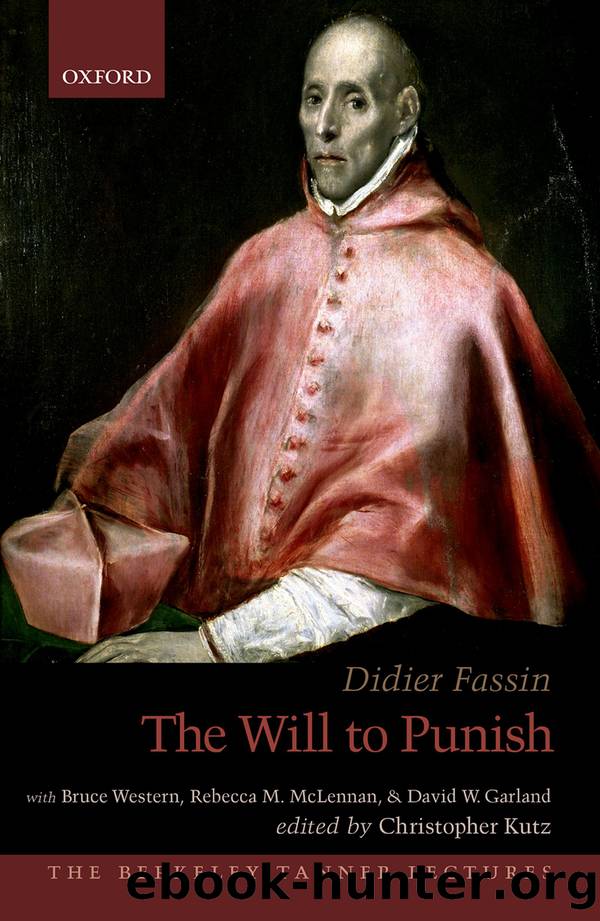The Will to Punish by Fassin Didier;Kutz Christopher;

Author:Fassin, Didier;Kutz, Christopher;
Language: eng
Format: epub
Publisher: Oxford University Press, Incorporated
Published: 2018-06-15T00:00:00+00:00
Chapter 3: Who Gets Punished?
Whereas the definition and justification of punishment have fascinated philosophers and jurists, generating substantial literature and rich discussions, its distribution has not received the same attention. Probably the question was hardly one for them since, from their viewpoint, the act of punishing was supposed to be fair, meaning that all offendersâand offenders onlyâwere to be punished on similar principles: a just justice, in sum, which did not call for more theoretical developments.1 The question: Who gets punished? fell to sociologists and criminologists for its scholarly aspects, and to human rights activists and lawyers for its applied dimension. It is as if the spectacular disparities observed across socioeconomic categories or ethnoracial groups did not make relevant objects for philosophy and law or simply revealed actual differences in the commission of crime. Moreover as both disciplines developed their analyses on the basis of specific situations, whether imagined or real, their casuistry-like reasoning made it difficult to identify systematic differences, which need to be apprehended at a collective level and measured via statistics.
Exceptions to this general observation regarding the relative lack of interest of philosophers and jurists for the unequal distribution of punishment should certainly be mentioned, particularly within the tradition of legal realism and, more recently, critical legal studies. However, the most remarkable but also most atypical of these exceptions is Foucaultâs work, notably his lectures at the Collège de France on âthe punitive society,â in which he dedicates a significant part of his reflection to what he calls the âcivil war,â an unusually dramatic formulation to refer to the eighteenth- and nineteenth-century penal system.2 This war is a âsocial war,â he writes, a âwar of rich against poor,â in which the criminal becomes a âsocial enemyâ whose punishment is justified by the fact that he is âsomeone who wages war on society.â Inasmuch as âsocial laws are made by people for whom they are not intended and applied to those who did not make them,â offenses can be differentiated between âpopular illegalisms,â mostly consisting in depredation, which should be repressed, and âbourgeois illegalisms,â principally frauds, which should be spared; the former are seen as an obstacle to the expansion of industrial capitalism, whereas the latter are regarded as its facilitator. Considered from this perspective, the question: Who gets punished? therefore implies another one: What gets punished?, with the latter legitimizing in some way the former. In answering these two interrogations, I will analyze first how the penal system produces a dual differentiation of the offenses and the offenders, and then how this social process is erased, ignored, or disavowed.
The relation between crime and punishment is more equivocal than we commonly presume. Reversing the expected sequence, Durkheim defines crime as âany act which, regardless of degree, provokes against the perpetrator the characteristic reaction known as punishment.â3 And he famously continues, âWe must not say that an act offends the common consciousness because it is criminal, but that it is criminal because it offends the common consciousness. We do not condemn it because it is a crime, but it is a crime because we condemn it.
Download
This site does not store any files on its server. We only index and link to content provided by other sites. Please contact the content providers to delete copyright contents if any and email us, we'll remove relevant links or contents immediately.
Tasting Mother-In-Law (Mother In Law Son In Law Erotic & Taboo Short Story) (Naughty In Law Book 3) by Rush Penny(409)
Carl Schmitt Between Technological Rationality and Theology by Hugo E. Herrera;(366)
EARLY GRAVE (Jake Lassiter Legal Thrillers Book 12) by Paul Levine(359)
The Love Conspiracy: An Age-Gap Lesbian Romance by Arias J.J(355)
HABEAS PORPOISE (Solomon vs. Lord) by Levine Paul(346)
The Rise of Critical Islam by Youcef L. Soufi(344)
If We Burn by Vincent Bevins(339)
Natural Rights on the Threshold of the Scottish Enlightenment by Unknown(332)
Democratic Quality in Southern Europe by Tiago Fernandes(331)
Tor and the Dark Net · Remain Anonymous Online and Evade NSA Spying (Tor, Dark Net, Anonymous Online, NSA Spying) by Smith James(321)
Toward revealing the controversy of bacterial biosynthesis versus bactericidal properties of silver nanoparticles (AgNPs): bacteria and other microorganisms do not per se viably synthesize AgNPs by Fatthy Mohamed Morsy(295)
Light-evoked depolarizations in the retina of <Emphasis Type="Italic">Strombus <Emphasis>: Role of calcium and other divalent cations by Unknown(287)
Women before the court by Lindsay R. Moore(254)
When Hope and History Rhyme by Douglas Burgess(231)
International Humanitarian Law and Justice by Mats Deland Mark Klamberg Pål Wrange(228)
The Crimes of Womanhood by A. Cheree Carlson(225)
A New Daddy by orphan_account(224)
To Raise and Discipline an Army by Joshua Kastenberg(221)
Witches, Wife Beaters, and Whores by Elaine Forman Crane(216)
